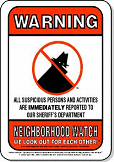Olde Cotswold Neighborhood Organization (OCNO)
OCNO Crime Watch

Police Contact Information
(704) 943-2400 "Zone Check" - call this number, ask to speak to a Sergeant, to have the Police check your home when you are away.
(704) 353-1000 - Non-Emergency Police Service (NEPS) - call this number to report non-emergency concerns or ask questions.
Low-cost, low-tech security tips
Low-tech security is a matter of avoiding problems, adding to the physical barriers between you and the bad guys and, yes, using a few mind games.
"It starts when you buy the house," says Dan Sullivan, former deputy chief of the Los Angeles Police Department and president of Investigative Services Corp. Residences that are more vulnerable are those on corner lots, have an alley behind them or are near a vacant lot, a spot where a criminal can easily case your house, he says.
Look for a community that has random police or security patrols. "That tends to discourage burglars," says Sullivan.
Talk to the police; ask for the community relations or public information officer. What's the crime rate in your potential neighborhood? What kinds of crimes occur there? What are the current problems?
Don't depend solely on law enforcement. Develop your own neighborhood network. A criminal hates nosy neighbors. And when you've got people you trust, says Sullivan, you can tell them, "I'm going away, if you see anyone in the driveway, call the police."
If you're a dog lover, consider getting one. A dog that makes noise can be very effective, says Sullivan.
Do you have a set of sliding glass doors? Secure them with a broom handle, thick wooden dowel or piece of PVC pipe, says Sullivan. Just make sure children or elderly people can maneuver it to get out in an emergency. While it won't always keep bad guys out, it will force them to break some glass (and make noise) to enter.
Make it look like you're home. Going out of town? Ask the neighbors to collect mail and flyers and turn lights on and off. Let them park in the driveway. And arrange to have the lawn cut. Even when you're not on vacation, use timers to turn lights off and on; that way even if you're late getting home from work or decide to eat out, it will look like someone is home.
Don't forget exterior lights. Set up a motion detector so that outside lights come on if someone approaches a front or back door. Easy to install, these go for $25 to $50 at a local home supply store, says Chris McGoey, president of McGoey Security Consulting and author of "Security: Adequate or Not?"
When you hire people to do work on or inside your home, screen all contractors and take precautions once the work begins. Use only those contractors who run criminal background checks. Have someone (preferably more than one) in the house while workers are there. Let workers see that there is security and that doors and windows are routinely locked. Remove all valuables from plain sight. Collect a driver's license and make a photocopy.
Finally, use common security sense:
*Lock your doors and windows, including the garage door.
*Don't leave keys outside. Those fake garden rocks aren't fooling anyone. Neither is the key "hidden" under the mat or in the planter.
*Keep trees and bushes trimmed. Overgrowth obscures windows, doors and other potential entrances to your home. You want a clear line of sight from the street; that means anyone lurking or attempting to get in will be out in the open.
*And make everyone aware that your house presents obstacles. "What we do is play a psychological game," says McGoey.
*Post "Beware of Dog" signs in your yard, regardless of whether you have one. Same goes with signs advertising your security system.
*And when dealing with strangers, let them know that you're security conscious. Simply saying "I have to have someone at home to let you in and reset the alarm system" or "I have to be there to chain up the dog and unlock the gate" could be what makes a potential burglar decide to move on to another property.


